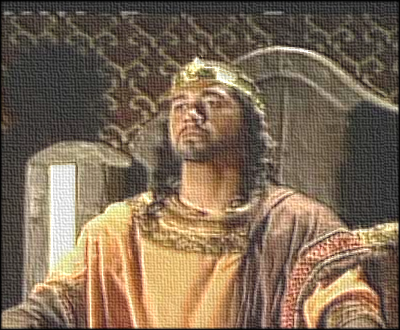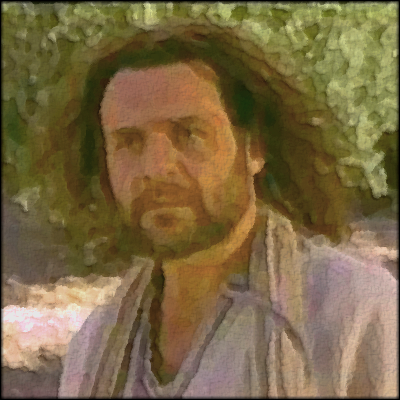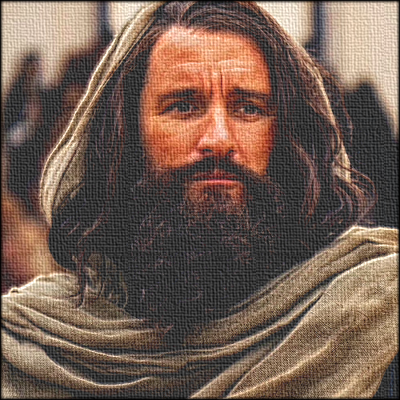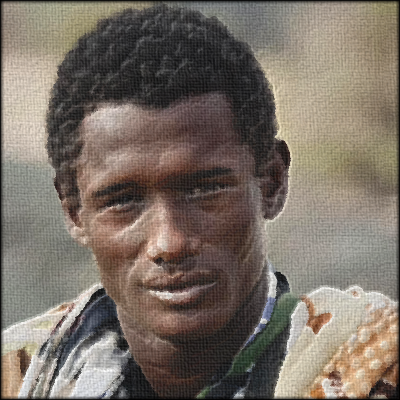

The story of Ruth comes from a time when Israel was governed by the Judges. This was before the time when the Israelites requested to be ruled by a king.
The book of Ruth tells the story of a man, Elimelek, from Bethlehem in Judah, Naomi his wife and their two sons who "...went to live for a while in the country of Moab." You see, the country where they lived was gripped by famine so severe that they had no choice but to move. The neighboring kingdom of Moab lay east of Judah on the other side of the Dead Sea. Today it would be located within the Kingdom of Jordan. They stayed in Moab for about ten years and during this time their two sons married Moabite women. Sadly, Naomi's husband died as did her two sons, leaving her alone with her two daughters-in-law, Orpah and Ruth.
Eventually word came that conditions in Judah had improved and Naomi set her heart to return home. She told her daughters-in-law to remain in their native land and remarry, but they were reluctant to separate from her. After much pleading, Orpah decided to remain in Moab. She kissed her mother-in-law goodbye, but Ruth clung to her. "Look", said Naomi, "your sister-in-law is going back to her people and her gods. Go back with her." But Ruth replied, "Don't urge me to leave you or to turn back from you. Where you go I will go, and where you stay I will stay. Your people will be my people and your God my God." Ruth 1:14-16


Israel throughout its history was frequently at war with its neighbors, not unlike the situation we have today. And so it was during the time of King David. David was the second king of Israel. By the time of this story he had moved his capital to Jerusalem. David sent Joab, his general, and the Israelite army to wage war with the kingdom of Ammon, but he remained at his palace.
"One evening David got up from his bed and walked around on the roof of the palace. From the roof he saw a woman [Bathsheba] bathing. The woman was very beautiful." 2 Samuel 11:2
David sent a servant to bring the woman to him and he spent the night with her. Now here is the hard part: Before he slept with her, he had been informed that she was the wife of Uriah the Hittite. Uriah was one of the soldiers fighting the Ammonites. This indiscretion may never have been discovered, but some time later Bathsheba sent word to David, saying, "I am pregnant."
2 Samuel 11:5
What was David to do? I would like to say he did the right thing according to his relationship with the Lord, but he did not. His first plan was to recall Uriah from the war in the hope he would go home and sleep with his wife. That plan failed much to the credit of Uriah's character. "The ark and Israel and Judah are staying in tents, and my commander Joab and my lord’s men are camped in the open country. How could I go to my house to eat and drink and make love to my wife? As surely as you live, I will not do such a thing!" 2 Samuel 11:11
So David came up with a new plan and it amounted to nothing less than murder. He sent Uriah back to the front carrying a message to be delivered to Joab. In it he wrote, "Put Uriah out in front where the fighting is fiercest. Then withdraw from him so he will be struck down and die." 2 Samuel 11:15
Man is able to commit crimes that may never be discovered, but nothing can be hidden from the Lord. And so it was that the prophet Nathan was sent to David. He began by telling the king a parable. Rather than reciting it here, I refer you to 2 Samuel 12:1-9.
The parable achieved the desired effect as David confessed his sin against man and God. The Lord forgave him, but the consequences of his action could not be undone. It would result in a profound impact on him personally as well as his kingdom.
If you recall, Daniel was one of the Hebrews who were taken captive when Judah was conquered by the Babylonian empire. When Babylon fell he became subject to the succeeding Medo-Persian empire, but Daniel became more than a subservient exile. As he had greatly impressed the Babylonian king Nebuchadnezzar, so had he the Persian king, Darius. In fact, Darius had appointed Daniel one of the three administrators in his government. A Hebrew exile placed in such a high and honorable position did not sit well with the other government officials. Wanting to discredit Daniel and have him removed they first tried to find some negligence in the performance of his duties. In this they failed so they devised a new plan. "We will never find any basis for charges against this man Daniel unless it has something to do with the law of his God." Daniel 6:5
Now it so happened that Daniel prayed to the Lord three times a day. He did this in his house near the window that faced toward Jerusalem. When the conspirators took notice of this they went to the king with a proclamation for him to sign and enforce. It stated "...anyone who prays to any god or human being during the next thirty days, except to you, Your Majesty, shall be thrown into the lions den." Daniel 6:7
Of course Darius thought this an excellent thing to do so he signed it. Daniel became aware of this plot but it did not alter his daily routine. And so these men, filled with a combination of envy and hatred for Daniel, went and reported this to Darius. This did not sit well with the king. No, he wasn't angry with Daniel. If anything he saw through the whole evil plan, but since he had signed the decree, he was trapped into having it carried out. Daniel was thrown into the lions den, and Darius spent a restless and sleepless night.
At the first light of day, King Darius ran to the lions den and anxiously called out, "Daniel, servant of the living God, has your God, whom you serve continually, been able to rescue you from the lions?" Daniel answered, "God sent his angel, and he shut the mouths of the lions." Daniel 6:20-22
And so you see how Daniel's pattern of living; his faith and religious observance converted the heart of King Darius.
Simon and his brother Andrew were the first disciples called in the beginning of Jesus' ministry. You may wonder how Simon acquired the moniker of Peter?
Jesus: "Who do people say that I am?"
Disciples: "Some say you are one of the prophets of old returned from the dead."
Jesus: "But who do you say I am?"
Simon: "You are the Messiah, the Son of the living God."
Jesus: "I tell you that you are Peter, and on this rock I will build my church, and the gates of Hades will not overcome it."
Despite all his positive attributes, Simon Peter was a rather mercurial person. A classical example of this occurred in the account where Jesus walked on water. Simon showed courage to step out of the boat and walk out to Jesus, until he became afraid and began to flounder.
Now we come to Peter's culminating trial and conversion. It is the Last Supper. Jesus and his disciples are in Jerusalem to celebrate the Passover, also called the Festival of Unleavened Bread (read Exodus chapter 12). Before breaking bread Jesus said, "I have eagerly desired to eat this Passover with you before I suffer."
Luke 22:15
There is no response from the disciples to this statement but I imagine they looked at each other wondering what he meant by this. They pictured him as the Messiah of an earthly Kingdom with them holding high positions in it. In fact they began to argue which one of them would be the greatest.
Jesus quickly put an end to this debate:
Jesus: "Satan desires to shake and separate you, but I have prayed that your faith fail not."
Simon Peter: "Lord, I am ready to suffer and die for you."
Jesus: "Peter, before the rooster crows you will say three times that you do not know me."

After the Passover meal, Jesus went out to the Mount of Olives to pray accompanied by his disciples. While there a crowd of armed men arrived sent by the Sanhedrin to arrest him. They bound him and took him away to be questioned. Simon Peter followed but kept his distance. One after another three people came up to Peter asking, "You are one of his disciples, aren't you?" And three times he vehemently denied knowing Jesus. Immediately after the third denial the rooster crowed. Then he remembered what the Lord said would happen, "And he went outside and wept bitterly." Luke 22:62

It was the gift of the Holy Spirit that fell on the day of Pentecost that breathed life into the early Christian movement. "You will receive power when the Holy Spirit comes on you; and you will be my witnesses in Jerusalem, and in all Judea and Samaria, and to the ends of the earth." Acts 1:8
From that day onward the apostles began to preach Jesus as Christ and the fellowship of believers were multiplied. This brought them into conflict with the established Judaic order. At that time "...a great persecution broke out against the church in Jerusalem; and all except the apostles were scattered throughout Judea and Samaria." One man, a devout Jew by the name of Saul, was a key figure in this persecution of the early church.
Saul received from the high priest permission to go to Damascus, a city in Syria, and bring back to Jerusalem under arrest any Christians he may find. On his way there suddenly a light shone around him from heaven. "...he fell to the ground, and heard a voice saying to him, 'Saul, Saul, why do you persecuting me?'" Acts 9:3-4
Saul inquired who was speaking to him. "I am Jesus, whom you are persecuting... Arise, go into the city, and you will be told what you must do." Saul obeyed but had to be led by the hand because he was blinded by the light. Saul was profoundly affected by this experience for "...he was three days without sight, and neither ate nor drank." During this time he prayed continuously. Another disciple was called for the laying on of hands on Saul to restore his sight for the Lord had chosen him to be his witness "...before gentiles, kings, and the children of Israel." Saul the persecutor became Paul the Lord's apostle.
"Therefore those who were scattered went everywhere preaching the word." Acts 8:4
Philip, one of the original 12 disciples, comes into this story as being instrumental in the conversion of an Ethiopian of some importance in his native country. His name is not revealed but what we do know is that he had come to Jerusalem to worship. It is actually well known there were, and still are to this day, many Jewish followers in Africa.
An angel of the Lord told Philip where he could find this Ethiopian. "Go south to the road—the desert road—that goes down from Jerusalem to Gaza... Philip ran up to the chariot and heard the man reading Isaiah the prophet. 'Do you understand what you are reading?', Philip asked." Luke 8:26, 30
Just so happened that the Ethiopian was reading from chapter 53 which describes the suffering and death of the Messiah. As it is written, "He was led as a lamb to the slaughter... For the transgressions of my people He was stricken." Isaiah 53:7-8
Philip then opened the mind of the Ethiopian from the scriptures regarding Jesus as Lord and Savior. The Ethiopian believed, was baptized by Philip, and returned to his country rejoicing and, I'm sure, became a witness that led to many more conversions.
